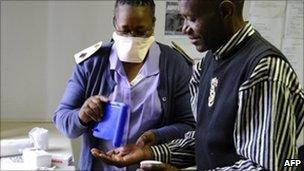South Africa unveils universal health care scheme
- Published

In South Africa 84% of residents cannot afford to take out private health insurance
South Africa's government has set out its plans to introduce a universal health care scheme.
A pilot scheme in 10 areas is to start in April 2012, and will then be phased in nationally over the next 14 years.
"These first steps towards establishing national health insurance are truly historic," the health minister said.
Analysts say South Africa is one of the world's most unequal societies, where quality health care is skewed towards the private sector.
More than 80% of South Africans cannot afford private medical insurance and rely on publicly funded hospitals, which charge a small fee for treatment and are often overstretched.
Health Minister Aaron Motsoaledi said the quality of care in public health institutions was "often totally unacceptable".
'More business'
"Without NHI [national health insurance], the burden of disease in the country will not be reduced because the majority of the population - and the section suffering the greatest ill health - will not access good quality health care," he said in a statement.
"If you earn above a certain income you will be required by law to make a contribution to the NHI Fund. It will not be possible to opt out of this responsibility," he said.
More details of the NHI scheme will be known later on Friday when the government's green paper on the legislation is published for comment.
It will then go back to parliament for consideration before it becomes law.
The BBC's Pumza Fihlani in Johannesburg says some people have raised concerns about paying for the scheme when they do not use it.
But Mr Motsoaledi said the aim of the green paper was to get the best out of the existing private and public health care systems - both of which needed reform.
"The private sector is held up as an example of good service and quality of care - and this is mostly justified. What is not justified is the price tag that comes with certain forms of private health care provision," he said.
"This is not only a burden to people using private health services, but a disservice to our country as a whole because it distorts pricing across the board."
All forms of primary health care will be covered by the scheme, but not other treatments like cosmetic surgery and aesthetic dental procedures.
"Private health care professionals are not opposed to the NHI because it will bring more business to them, but they want to see what the paper sets out," Dr Norman Mabasa, president of the South African Medical Association, told Reuters news agency.
Last year, the governing African National Congress (ANC) estimated initial costs to set up the scheme would be about 128bn rand ($18bn; £11bn).
"The central challenge to the stability and well-being of our nation is reducing the deep inequality between rich and poor, between privilege and deprivation. This goes to the heart of South Africa's future," Mr Motsoaledi said.
Other African countries have various forms of national health insurance, although some still find it difficult to fund.
Dr Doyin Oluwole, from US-based global health organisation FHI360, told the BBC's Network Africa programme South Africa could learn from Rwanda.
"Rwanda started free health care in 1994 but by 1999 they realised that it was not sustainable, and they introduced community-based health insurance," she said.
"As of end of 2010, Rwanda is covering over 90% with one form of health insurance or the other."
- Published28 February 2011
- Published21 May 2013
- Published20 August 2010